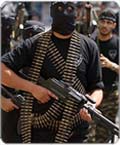WASHINGTON – U.S. Federal Gun Laws have done a great job at preventing and denying gun purchases to those who are not eligible, under the Brady Bill and other laws, namely those who are:

- Convicted Felons or those under indictment for a felony
- Known fugitives from justice in any state
- Individuals who were dishonorably discharged from military service.
- Unlawful drug users and convicted drug addicts or dealers
- Individuals who have ever been involuntarily committed to a mental institution or have been legally declared mentally incompetent
- Illegal aliens, and those legal aliens who are admitted to the United States on a non immigrant visa, such as a temporary work permit or student visa
- A person who has officially renounced their American citizenship.
- Persons convicted of misdemeanor domestic violence offences
- Someone under certain domestic violence restraining orders
Fall into any of the mentioned situations and you will fail the background check required to purchase a firearm, but unfortunately being on the FBI’s terrorist watch list does not fail you from the background check.
A military veteran organization is lobbying to fix this oversight by reviving a long overdue bill – Denying Firearms and Explosives to Dangerous Terrorists Act. Under this law the FBI can now deny gun purchases to people in the watch list, closing what the group calls the “terror gap.”
“This is common-sense legislation that does not infringe on a gun-owner’s rights, and will protect our troops and our nation,” said Vet Voice Foundation in a press release. The group, founded by veteran and progressive activist Jon Soltz, recently formed a new working group to rally veterans and ramp up pressure on Congress to prohibit gun sales to people on the terrorist list.
The motivation behind the move is the continued threat to men and women in uniform, who have been targeted by shooting attacks over the past few years. In addition to shootings at Fort Hood in Texas in 2009, that same year a military recruiting station in Little Rock, Ark., was fired upon. Terrorist suspects also attempted to purchase weapons to attack Fort Dix, N.J., in 2007.
A 2011 report by the Government Accounting Office found that from February 2004 to February 2010, “individuals on the terrorist watch list were involved in firearm or explosives background checks 1,228 times; 1,119 (about 91%) of these transactions were allowed to proceed because no prohibiting information was found.”
Gun lobbyists, however, disagree. The National Rifle Association is adamantly opposed to the law. The group posted a fact sheet online in April 2011 saying that the bill was “aimed primarily at law-abiding American gun owners.” The NRA said that such gun owners could be in jeopardy of jail time if they were mistakenly or arbitrarily placed on the watch list. “Ninety-five percent of watch listed persons are already prohibited from acquiring firearms in the U.S., because they are not U.S. citizens or legal resident aliens,” they wrote.

